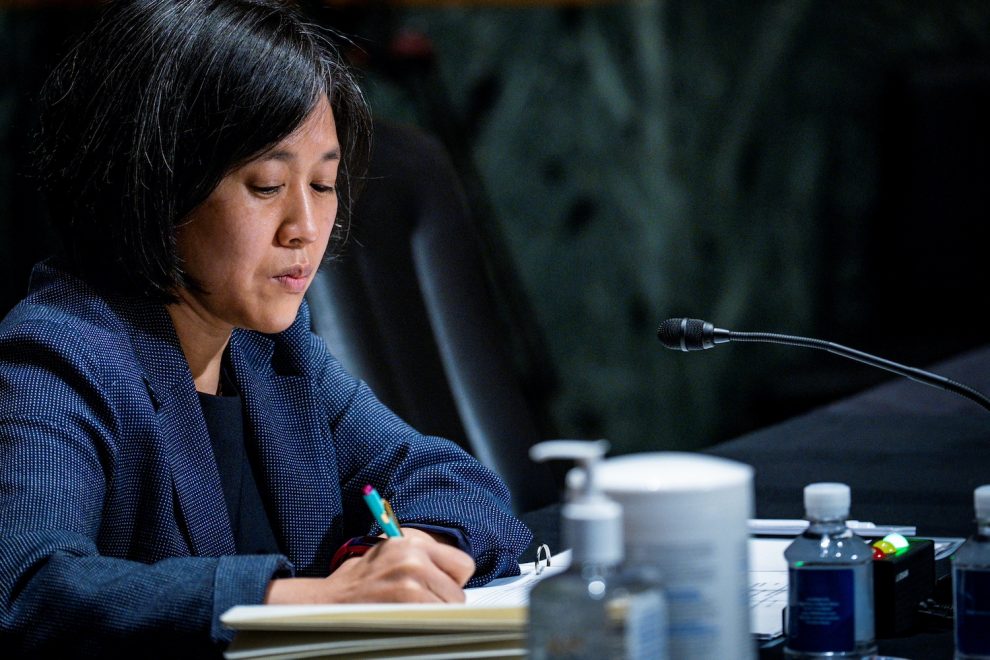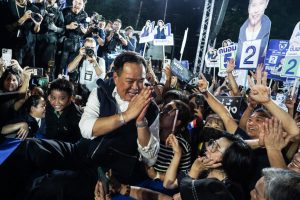US Trade Representative Katherine Tai had talks with China’s Vice-Premier Liu He, which Beijing described as ‘pragmatic and constructive’; meanwhile, Biden’s senior Asia official, Kurt Campbell, said the era of bilateral engagement was over and “the dominant paradigm is going to be competition”
(AF) Senior trade officials from the US and China had a “candid” exchange on Wednesday which Beijing later described as pragmatic and constructive.
US Trade Representative Katherine Tai had a call to Chinese Vice Premier Liu He, in which she raised “issues of concern”, but details about that were not specified.
“During their candid exchange, Ambassador Tai discussed the guiding principles of the Biden-Harris administration’s worker-centered trade policy and her ongoing review of the US-China trade relationship, while also raising issues of concern,” the USTR said later.
China’s Commerce ministry described the talks as “a candid, pragmatic and constructive exchange”.
“Both sides view the development of bilateral trade as very important. (Both sides) exchanged views on issues of mutual concern and agreed to maintain communication.”
The meeting was the first formal engagement between the trade chiefs of the world’s two largest economies since President Joe Biden took office in January.
Meanwhile, Biden’s top official on Asia was reported to have said the US is entering a period of intense competition with China, because it is tightly controlled by President Xi Jinping.
Kurt Campbell, coordinator for Indo-Pacific affairs at the National Security Council, spoke at an event hosted by Stanford University on Wednesday. He was quoted as saying: “The period that was broadly described as engagement has come to an end,” and that bilateral ties would now occur under a “new set of strategic parameters,” and the “dominant paradigm is going to be competition.”
Katherine Tai, who spoke with Reuters before her call with Liu He, said the United States still faces “very large challenges” in its trade and economic relationship with China that require the Biden administration’s attention across the board.
Biden has criticized China on human rights abuses and sought to rally allies among the Group of Seven nations that it classes as allies to form a united front on China.
China’s handling of the Covid-19 pandemic – which has killed more than 3 million people worldwide – has upset the US and its allies. Also on Wednesday, Biden ordered aides to investigate rival theories held by US intelligence agencies on the origin of the virus, including the possibility of a laboratory accident in China.
China said it supported a ‘thorough investigation’ but warned the United States to avoid politicizing the issue.
Meanwhile, Tai and Commerce officials are conducting a comprehensive review of US-China trade policy, ahead of the expiry of the Phase 1 deal at the end of 2021.
‘VERY LARGE CHALLENGES’
Tai told Reuters the Phase 1 trade deal was important but only part of a complex relationship.
“The overall challenges that we have with China are also still there and they are very large,” Tai said.
Tai said the Phase 1 trade deal should be seen in the context of “the overall US-China trade, and economic relationship which is very, very challenging. And requires our attention all across the board.”
The two countries signed the trade deal in January 2020 – just before the pandemic began. It called for China to increase purchases of US agricultural goods, manufactured products, energy and services by $200 billion over 2020 and 2021, compared with a 2017 baseline.
The deal eased a two-year tariff war between the United States and China waged by former President Donald Trump that aimed to change China’s trade practices, although duties remain in place on hundreds of billions of dollars of trade.
The Biden administration has promised a similarly muscular pushback on China’s state-driven economic model, with new investments in innovation to maintain a US technological edge.
China fell about 40% short of its purchase targets in 2020, and is still lagging in its imports in 2021, with just seven months to go in the two-year deal.
Through 2020, China’s total imports of covered products from the United States were $99.9 billion, compared with the commitment of $173.1 billion, according to the Peterson Institute for International Economics.
China also agreed to ease barriers in its financial services sector and agricultural biotechnology regulations, as well as to take steps to protect US intellectual property.
The deal failed to address fundamental US concerns about technology transfer and massive subsidies for state-owned enterprises – issues that the Trump administration had said it would address in a second phase trade agreement.
With reporting by Reuters
ALSO SEE:
Biden orders ‘Wuhan lab leak’ report from intelligence agencies
US trade rep signals push for laws to combat ‘China threats’
























